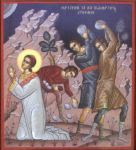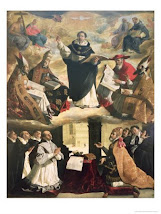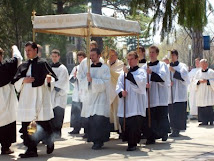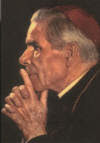MINISTRY OF THE WORD IN THE CHURCH
17 The ministry of the word takes many forms, including catechesis, according to the different conditions under which it is practiced and the ends which it strives to achieve.
There is the form called evangelization, or missionary preaching. This has as its purpose the arousing of the beginnings of faith (cf. CD, 11,13; AG, 6,13,14), so that men will adhere to the word of God.
Then there is the catechetical form, "which is intended to make men's faith become living, conscious, and active, through the light of instruction" (CD, 14).
And then there is the liturgical form, within the setting of a liturgical celebration, especially that of the Eucharist (e.g., the homily) (cf. SC. 33. 52: "Inter Oecum." 54).
Finally, there is the theological form, that is, the systematic treatment and the scientific investigation of the truths of faith.
For our purpose it is important to keep these forms distinct, since they are governed by their own laws. Nevertheless, in the concrete reality of the pastoral ministry, they are closely bound together.
Accordingly, all that has so far been said about the ministry of the word in general is to be applied also to catechesis.
There is the form called evangelization, or missionary preaching. This has as its purpose the arousing of the beginnings of faith (cf. CD, 11,13; AG, 6,13,14), so that men will adhere to the word of God.
Then there is the catechetical form, "which is intended to make men's faith become living, conscious, and active, through the light of instruction" (CD, 14).
And then there is the liturgical form, within the setting of a liturgical celebration, especially that of the Eucharist (e.g., the homily) (cf. SC. 33. 52: "Inter Oecum." 54).
Finally, there is the theological form, that is, the systematic treatment and the scientific investigation of the truths of faith.
For our purpose it is important to keep these forms distinct, since they are governed by their own laws. Nevertheless, in the concrete reality of the pastoral ministry, they are closely bound together.
Accordingly, all that has so far been said about the ministry of the word in general is to be applied also to catechesis.
CATECHESIS AND EVANGELIZATION
18 Catechesis proper presupposes a global adherence to Christ's Gospel as presented by the Church. Often, however, it is directed to men who, though they belong to the Church, have in fact never given a true personal adherence to the message of revelation .
This shows that, according to circumstances, evangelization can precede or accompany the work of catechesis proper. In every case, however, one must keep in mind that the element of conversion is always present in the dynamism of faith, and for that reason any form of catechesis must also perform the role of evangelization.
This shows that, according to circumstances, evangelization can precede or accompany the work of catechesis proper. In every case, however, one must keep in mind that the element of conversion is always present in the dynamism of faith, and for that reason any form of catechesis must also perform the role of evangelization.
FORMS OF CATECHESIS
19 Because of varied circumstances and multiple needs, catechetical activity necessarily takes various forms.
In regions which have been Christian from of old, catechesis often takes the form of religious instruction given to children and adolescents in schools or outside a school atmosphere. Also found in those regions are various catechetical programs for adults. There are also various catechumenate programs for those who are preparing themselves for the reception of baptism, or for those who have been baptized but lack a proper Christian initiation. Very often the actual condition of large numbers of the faithful necessarily demands that some form of evangelization of the baptized precede catechesis.
In churches that have been established recently, special importance is placed on the work of evangelizing in the strict sense. Accordingly, they have the well-known form of the catechumenate for those who are being initiated in the faith so that they may prepare themselves for receiving baptism (cf. AG, 4).
In a word, catechetical activity can take on forms and structures that are quite varied, that is to say, it can be systematic or occasional, for individuals or for communities, organized or spontaneous, and so on.
20 Shepherds of souls should always keep in mind the obligation they have of safeguarding and promoting the enlightenment of Christian existence through the word of God for people of all ages and in all historical circumstances (cf. CD, 14), so that it may be possible to have contact with every individual and community in the spiritual state in which each one is.
They should also remember that catechesis for adults, since it deals with persons who are capable of an adherence that is fully responsible, must be considered the chief form of catechesis. All the other forms, which are indeed always necessary, are in some way oriented to it. In obedience to the norms of the Second Vatican Council, shepherds of souls should also strive "to reestablish or better adapt the instruction of adult catechumens" (CD, 14; cf. AG, 14).
FUNCTIONS OF CATECHESIS
21 Within the scope of pastoral activity, catechesis is the term to be used for that form of ecclesial action which leads both communities and individual members of the faithful to maturity of faith.
With the aid of catechesis, communities of Christians acquire for themselves a more profound living knowledge of God and of his plan of salvation, which has its center in Christ, the incarnate Word of God. They build themselves up by striving to make their faith mature and enlightened, and to share this mature faith with men who desire to possess it.
For every man whose mind is open to the message of the Gospel, catechesis is a particularly apt means for him to understand God's plan in his own life and to examine the highest meaning of existence and history so that the life of individual men and of society may be illumined by the light of the kingdom of God and be conformed to its demands, and the mystery of the Church as the community of those who believe in the Gospel may be able to be recognized.
All these things determine the functions proper to catechesis.
CATECHESIS AND THE GRACE OF FAITH
22 Faith is a gift of God which calls men to conversion. "For this faith to be given, the grace of God and the interior help of the Holy Spirit must precede and assist, moving the heart and turning it to God, opening the eyes of the mind and giving joy and ease to everyone in assenting to the truth and believing it" (DV. 5).
The Christian community, listening to the word of God religiously, lives in a mature faith, constantly strives for conversion and renewal, and gives diligent ear to what the Spirit says to the Church.
Catechesis performs the function of disposing men to receive the action of the Holy Spirit and to deepen their conversion. It does this through the word, to which are joined the witness of life and prayer.
CATECHESIS AND PERFORMANCE OF THE DUTIES OF THE FAITH
23 A person mature in the faith fully accepts the Gospel invitation by which he is impelled to communion with God and with his brothers; he takes on in his life the duties that are connected with this invitation (cf. AG, 12).
Catechesis performs the functions of helping men make this communion with God a reality, and of presenting the Christian message in such a way that it is clear that the highest value of human life is safeguarded by it. All this requires that catechesis keep in mind the legitimate aspirations of men, as also the progress and success of the values contained in these aspirations:
Communion with God and adherence to him entail the carrying out of human responsibilities and the duty of solidarity, since all these things are in keeping with the will of God the Savior (cf. GS, 4).
Catechesis, therefore, must foster and illumine the increase of theological charity in individual members of the faithful as well as in ecclesial communities, and also the manifestations of that same virtue in connection with the duties that pertain to individuals and to the community.
CATECHESIS AND KNOWLEDGE OF THE FAITH
24 A person mature in the faith knows the mystery of salvation revealed in Christ, and the divine signs and works which are witnesses to the fact that this mystery is being carried out in human history. It is, therefore, not sufficient for catechesis merely to stimulate a religious experience, even if it is a true one, rather catechesis should contribute to the gradual grasping of the whole truth about the divine plan by preparing the faithful for the reading of Sacred Scripture and the learning of tradition.
CATECHESIS AND THE LIFE OF LITURGICAL AND PRIVATE PRAYER
25 "Every liturgical celebration, because it is an action of Christ the priest and of his Body the Church, is a sacred action surpassing all others. No other action of the Church can match its claim to efficacy, nor equal the degree of it" (SC, 7). And the more mature a Christian community becomes in faith, the more it lives its worship in spirit and in truth (cf. John 4, 23) in its liturgical celebrations, especially at the Eucharist.
Therefore, catechesis must promote an active, conscious, genuine participation in the liturgy of the Church, not merely by explaining the meaning of the ceremonies, but also by forming the minds of the faithful for prayer, for thanksgiving, for repentance, for praying with confidence, for a community spirit, and for understanding correctly the meaning of the creeds. All these things are necessary for a true liturgical life.
"The spiritual life, however, is not confined to participation in the liturgy. The Christian is assuredly called to pray with his brethren, but he must also enter into his chamber to pray to the Father in secret (cf. Matt. 6, 6), indeed, according to the teaching of the Apostle Paul (cf. 1 Thess. 5, 17), he should pray without ceasing" (SC, 12).
Therefore, catechesis must also train the faithful to meditate on the word of God and to engage in private prayer.
CATECHESIS AND CHRISTIAN LIGHT ON HUMAN EXISTENCE
26 A person mature in the faith is able to recognize in various circumstances and encounters with his fellowman the invitation of God whereby he is called to work toward the fulfillment of the divine plan of salvation.
Catechesis has the task, then, of emphasizing this function by teaching the faithful to give a Christian interpretation to human events, especially to the signs of the times, so that all "will be able to test and interpret all things in a wholly Christian spirit" (GS, 62).
CATECHESIS AND UNITY OF CHRISTIANS
27 Communities of the faithful should, according to the circumstances in which they live, take part in ecumenical dialogue and the other undertakings for the restoring of Christian unity (cf. UR, 5).
Catechesis should, therefore, assist in this cause (cf. UR, 6) by clearly explaining the Church's doctrine in its entirety (cf. UR, 11) and by fostering a suitable knowledge of other confessions, both in matters where they agree with the Catholic faith, and also in matters where they differ. In doing this, it should avoid words and methods of explaining doctrine that could "lead separated brethren or anyone else into error regarding the true doctrine of the Church" (LG, 67). The order or hierarchy of the truths of Catholic teaching should be kept (cf. UR, 11; AG, 15; "Ad Ecclesiam totam," May 14, 1967, AAS, 1967, pp. 574-592). However, the case for Catholic doctrine should be presented with charity as well as with due firmness.
CATECHESIS AND THE MISSION OF THE CHURCH IN THE WORLD
28 The Church is in Christ like a sacrament or sign and an instrument of the salvation and of the unity of the whole human race (cf. LG, 1). It will be more noted as such, however, the more mature in faith the individual communities of the faithful become.
Catechesis should help these communities to spread the light of the Gospel and to establish a fruitful dialogue with men and cultures that are not Christian, preserving here religious freedom correctly understood (cf. DH; AG, 22).
CATECHESIS AND ESCHATOLOGICAL HOPE
29 A person mature in the faith directs his thoughts and desires to the full consummation of the kingdom in eternal life.
Catechesis, therefore, performs the function of directing the hope of men in the first place to the future goods which are in the heavenly Jerusalem. At the same time, it calls men to be willing to cooperate in the undertakings of their neighbors and of the human race for the improvement of human society (cf. GS, 39, 40-43).
CATECHESIS AND DEVELOPMENT OF THE LIFE OF FAITH
30 Among the faithful the one faith is found to be more or less intense according to the grace that is given to each one by the Holy Spirit, grace which must constantly be asked for in prayer (cf. Mark, 9, 23), and according to the response that each one gives to this grace. Moreover, the life of faith passes through various stages, just as does man's existence while he is attaining maturity and taking on the duties of his life. Consequently, the life of faith admits of various degrees, both in the global acceptance of the total word of God and in the explanation of that word and the application of it to the different duties of human life, according to the maturity of each and the differences of individuals (cf. n. 38). Certainly, the acceptance of this faith and its explanation and application to the life of man are different according to whether there is question of the very young, children, adolescents, young adults, or adults. Catechesis has the function of lending aid for the beginning and the progress of this life of faith throughout the entire course of a man's existence, all the way to the full explanation of revealed truth and the application of it to man's life.
RICHNESS OF CATECHETICAL WORK
31 Catechesis is concerned with the community, but it does not neglect the individual believer. It is linked with the other pastoral functions of the Church, but it does not lose its own specific character. At one and the same time it performs the functions of initiation, education, and formation.
It is very important that catechesis retain the richness of these various aspects in such a way that one aspect is not separated from the rest to the detriment of the others.
EFFICACY OF THE WORD OF GOD IN CATECHESIS
32 This sentence from Sacred Scripture is pertinent also to catechesis: "Indeed, God's word is living and effective" (Heb. 4, 1 2).
The divine word becomes present in catechesis through the human word. So that it may bear fruit in man and generate inner movements which expel indifference or uncertainty and lead him to embrace the faith, catechesis ought to express the word of God faithfully and present it suitably. Furthermore, the witness given by the life of both the catechist and the ecclesial community contributes very much to the efficacy of catechesis (cf. n. 35).
Catechesis, therefore, should convey the word of God, as it is presented by the Church, in the language of the men to whom it is directed (cf. DV, 13; OT, 16). When God revealed himself to the human race, he made the human word the sign of his word, expressing his word in a language that belonged to a particular culture (cf. DV, 12). The Church, to whom Christ entrusted the deposit of revelation, strives until the consummation of the world to transmit, explain, and interpret this word in a lively manner for the peoples of every culture and for men of every condition.
PEDAGOGY OF GOD IN REVEALING AND OF THE CHURCH IN CATECHIZING
33 In the history of revelation God used pedagogy in such a way that he announced his plan of salvation in the Old Covenant prophetically and by means of figures, and thus prepared the coming of his Son, the author of the New Covenant and the perfecter of the faith (cf. Heb. 12, 2).
Now, however, after the consummation of revelation, the Church has the obligation of sharing the entire mystery of our salvation in Christ with the people to be instructed. Mindful of the pedagogy used by God, she too uses a pedagogy, a new one, however, one that corresponds to the new demands of his message. The Church sees to it, of course, that this message, when it has been presented without adulteration or mutilation, is accommodated to the ability of the people to be taught.
On the one hand, in order to take account of the limited ability of some, the Church explains matters rather simply and briefly, using even suitable summary formulas, which may be explained further later. On the other hand, she tries to satisfy the requirements of the more lively and capable minds by using more profound explanations.
PRESERVING FIDELITY TO GOD AND HAVING CONCERN FOR MEN
34 The Church performs this kind of function chiefly by means of catechesis (cf. DV, 24). By drawing the truth from the word of God and faithfully adhering to the secure expression of this word, catechesis strives to teach this word of God with complete fidelity. The function of catechesis, however, cannot be restricted to repetition of traditional formulas; in fact, it demands that these formulas be understood, and be faithfully expressed in language adapted to the intelligence of the hearers, using even new methods when necessary. The language will be different for different age levels, social conditions of men, human cultures, and forms of civil life (cf. DV, 8; CD, 14).
THE NECESSITY OF ECCLESIAL WITNESS
35 Catechesis, finally, demands the witness of faith, both from the catechists and from the ecclesial community, a witness that is joined to an authentic example of Christian life and to a readiness for sacrifice (cf. LG, 12,17; NA, 2).
Man encounters Christ not only through the sacred ministry, but also through individual members of the faithful and their communities (cf. LG, 35), and these accordingly have a duty to give witness. If such witness is lacking, there arises in the listeners an obstacle to the acceptance of God's word.
Catechesis must be supported by the witness of the ecclesial community. It speaks more effectively about those things which in fact exist in the community's external life as well. The catechist is in a certain way the interpreter of the Church among those who are to be instructed. He reads the signs of faith and he teaches others how to read them. The chief of these signs is the Church herself (cf. First Vatican Council, Dogm. Const. "Dei Filius," Dz.-Sch. 301 4) .
Hence it is clear how necessary it is that the ecclesial community, according to the mind of the Church and under the guidance of her bishops, remove or correct things that mar the appearance of the Church and constitute an obstacle for men to embrace the faith (cf. GS, 19).
Catechists, therefore, have the duty not only to impart catechesis directly, but also to offer their help in making the ecclesial community come alive, so that it will be able to give a witness that is authentically Christian.
Catechetical action, therefore, fits into that general pastoral action in which all elements of ecclesial life are properly ordered and bound together (cf. GS, 4, 7, 43).




































No comments:
Post a Comment